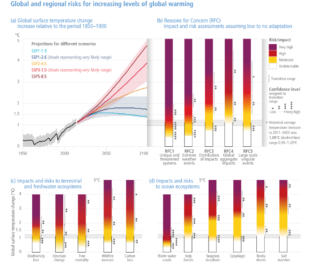-
IPCC report outlines bleak human and ecosystem futures, but worst can be averted
Date posted:
-
-
-
Post Author
Patrick LaveryCombustion Industry News Editor
-
-
The Sixth Assessment Report of Working Group II of the Intergovernmental Panel on Climate Change has been released, focusing on impacts, adaptation and vulnerability, with a higher integration between natural, ecological, social and economic sciences than earlier IPCC assessments. Its findings are bleak, with many of the impacts of climate change now “irreversible”, though the very worst effects are still avoidable if action is taken rapidly.
- Impacts on human systems are already widely observed, including water availability, agricultural and livestock production, fisheries, health and wellbeing, and built infrastructure; most of them negative, but some mixed. As ever, confidence in the findings varies, but they are largely significantly worse than previously estimated in the Fifth Assessment Report. Different regions are being affected differently – for instance, impacts on Africa and small islands are uniformly negative for human systems, while for Europe, North America and Asia there are mixed impacts for food production and water availability. In some aspects of human systems, effects are entirely negative across regions, such as infectious disease, heat, mental health, displacement, flooding of coastal areas and damage to infrastructure (though there are some gaps in available scientific assessments). About 40% of the world’s population is currently “highly vulnerable” to the impacts of climate change.
- Near term (2021-2040) impacts from global average surface temperature rises reaching 1.5°C will “cause unavoidable increases in multiple climate hazards and present multiple risks to ecosystems and humans”, though limiting it to 1.5°C would “substantially reduce projected losses and damages related to climate change”. For biodiversity loss, impacts are expected to be moderate to high for forests, kelp and seagrass systems, and high to very high for Arctic sea-ice and terrestrial ecosystems, as well as warm-water coral reefs. The impacts on human systems will also increase, especially for infrastructure around coastal and other low-lying areas. Violent conflict and migration, though influenced by climate change, will be more affected by socio-economic conditions and governance at such a level of warming.
- In the longer term (2041-2100), for “127 identified key risks, assessed mid- and long-term impacts are up to multiple times higher than currently observed.” The report goes on to say that the “magnitude and rate of climate change and associated risks depend strongly on near-term mitigation and adaptation actions, and projected adverse impacts and related losses and damages escalate with every increment of global warming”. For instance, in terrestrial ecosystems, 3-14% of assessed species would likely face a very high risk of extinction at 1.5°C, 3-18% at 2.0°C, 3-29% at 3.0°C, 3-39% at 4.0°C, and 3-48% at 5.0°C. Other risks to ecosystems and human systems are to increase also, as summarised in the following charts taken from the report:
![]()

- Importantly, too, the report notes that climate change impacts and risks “are becoming increasingly complex and more difficult to manage. Multiple climate hazards will occur simultaneously, and multiple climatic and non-climatic risks will interact, resulting in compounding overall risk and risks cascading across sectors and regions. Some responses to climate change result in new impacts and risks.” As an example, risks “to food safety from climate change will further compound the risks to health by increasing food contamination of crops from mycotoxins and contamination of seafood from harmful algal blooms, mycotoxins, and chemical contaminant.”
It makes for dismal and alarming reading, with UN Secretary General Antonio Guterres describing it as an “atlas of human suffering”, adding that the “world’s biggest polluters are guilty of arson of our only home,” the only solid ray of hope being that the worst is still able to be avoided by drastic greenhouse gas emissions reductions. Professor Debra Roberts, co-chair of the IPCC, told the BBC that “this is the decade of action, if we are going to turn things around.”

